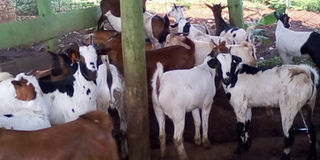How a WhatsApp group is demystifying goat marketing

Goats brought to the ‘WhatsApp’ market in Gayaza for sale. Photo by Tony Mushoborozi
What you need to know:
- Anyone who has tried their hand at goat farming knows how frustrating it can be to sell goats. The frustration is not so much about the lack of willing buyers, but rather the unfair prices.
- Tony Mushoborozi writes how a WhatsApp group is changing all this.
The Goaters Network was opened on March 17, 2015. It was soon inundated by frustrated goat farmers. From the onset, group conversations tended to lean more towards the fact that they were being terribly cheated by traders.
The group had been created by Jacqueline Tugume, an exasperated goat farmer herself. She was looking to connect with other farmers, in the hope of sharing ideas and helping each other solve the common problems, among which was better goat prices.
Tugume had been running a goat farm since 2007. As a stay-home mother, the goat farm was all she had as her personal source of income. But the middlemen had frustrated her without end for years. When she created the group, she was pleasantly surprised to find that all the other goat farmers were looking for ways of cutting off the middlemen.
For months, the conversation raged on. No one knew what to do.
Members cried that no matter where you took your goats for sale, you were always boxed into a corner until you sold at unfavourable prices.
But as they say, when you think long enough about a problem, you will eventually find an answer, especially if the process is a combined effort.
Over a year later, a metamorphosis happened. The WhatsApp group became a cooperative society. Nile Goat Farmers Cooperative Society was born in April 2016.
The idea behind the cooperative society was to form a centralised market, in a gazetted location, where they would be able to bypass the traders and sell the goats to the final buyers themselves.
“First thing we needed to do was to rent land. It had to be big enough to house a display farm where the goats would be kept awaiting selling. It would have to be as close to Kampala as possible. We got 10 acres in Kiwenda, 20km north of Kampala. We then pooled money to prepare the land for the project, and to pay the rental fees,” says Tugume.
How it works
The market in Kiwenda outgrew the group in no time. Though it had been created to help members get the right prices for their goats, they soon realised so many farmers wanted to use their services. So now it is open to farmers outside the group.
“When a member needs to sell goats, all he or she has to do is transport the goats to Kiwenda. On arrival, the goats are checked for any health problems and signed in. The farmer leaves the goats at the market and goes home. We give them a week in which they will receive their money on the phone,” she says.
Members pay Shs5,000 per goat, while non member pay Shs10,000.
Incorruptible standard system
To make sure that no farmer is cheated, every goat is weighed in the presence of the owner so that before they leave, they know how much money to expect. The co-op uses a global standard weighing format for live weight. A goat is placed in a bag and weighed. Its gross weight is then divided by two to arrive at the net weight, which is the usable meat. So if the goat is 10kg, the farmer gets paid for 5kg, priced at Shs12,000 each. The other half of the weight accounts for the parts that will be thrown away. The same system is used when a buyer comes to buy the same goat.
Growing market
Robert Kisakye had been interested in goat farming for years. He knew he had to get some sort of training before digging into his dream. Then one day, he read about a training organised by Nile Goat Farmers Cooperative society.
He had never heard about them before but anyway, he was convicted to attend.
Armed with the knowledge he had acquired, bought four goats from the group at Kiwenda. A year later, he joined the cooperative. Today, a little over two years later, he has more than 80 goats.
Besides people like Kisakye who want to start goat farms on a firm knowledge base, the Kiwenda market is gaining more and more customers because of their reliant system. Restaurants, butchers and wedding planners have all joined the queue.
Change forever
This group of young, educated workers are determined to change the goat farming terrain forever. Besides setting a system of buying and selling goats that is fair to all, they help each other minimise mistakes at the farm.
They work together to find market for their goats, mostly on social media, and word-of-mouth. They also aim at increasing the numbers of goat population so that Uganda can start exporting.
The group has found a huge market in Dubai, UAE but supply is insufficient locally. The group is now focusing on breeding high quality goats in order to increase numbers exponentially.




